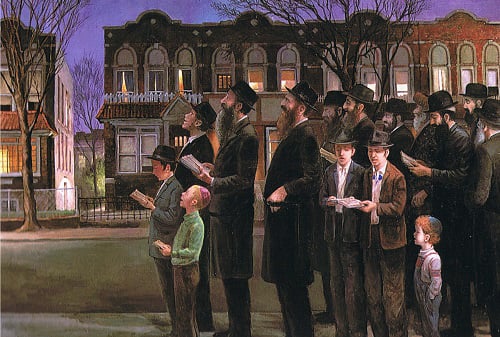Each month, as the new moon grows in the night sky, we turn to Kiddush Levanah (“Sanctification of the Moon”), a monthly blessing instituted by the Sages. Though the term Kiddush Levanah is commonly used, especially among Ashkenazim, its earlier name—still used in Sephardic communities and cited in the Shulchan Aruch—was Birkat HaLevanah (“Blessing of the Moon”).
Along with the actual blessing, we recite various psalms and prayers, including the intriguing custom to say the phrase David melech Yisrael chai vekayam (“David, King of Israel, is alive and enduring”) three times. This begs the question: Why?
Renewal of the Davidic Kingdom
Now, as anyone who has read the Book of Samuel knows, King David passed away. So what does “alive and enduring” refer to? It means that the Davidic dynasty, which will continue through King Moshiach, lives on.
Since King David’s sovereignty is compared to the moon1 and is destined to be renewed in the future (as the moon is renewed each month), it is apt to celebrate its eternality as part of Kiddush Levanah, explains Rabbi Moshe Isserlis, known as the Rema,2 citing Rabbeinu Bechaye.3
This also explains, says the Rema, why it is customary to break out in joyous dancing after Kiddush Levanah—we are elated that we will one day be reunited with G‑d in the era of Moshiach.
Secret Message
It appears that the origin of this line and its placement in Kiddush Levanah dates back to the terrible time when the Romans forbade the Jewish people to declare the new month and keep the Jewish calendar (the very first mitzvah G‑d gave Moses). Without it, they knew, Judaism would not be able to function.
Undeterred, Rabbi Yehudah HaNasi, leader of the Jewish people and a scion of the House of David, whose role it was to sanctify the new month, sent Rabbi Chiyya to sanctify the new month in Ein Tav and asked him to send back a secret code—David melech Yisrael chai vekayam—when he had done so.4
Commentaries5 note that the phrase דוד מלך ישראל חי וקים (“David, King of Israel, lives and endures”) shares the same numeric value (gematria) as ראש חודש (Rosh Chodesh). Let’s break down the values:
דוד מלך ישראל חי וקים
- דוד = 14
- מלך = 90
- ישראל = 541
- חי = 18
- וקים = 156
Total: 14 + 90 + 541 + 18 + 156 = 819
ראש חודש
- ראש = 501
- חודש = 318
Total: 501 + 318 = 819
This is likely exactly what Rabbi Yehudah intended: a coded phrase signaling the sanctification of the new month—Rosh Chodesh—while also affirming the enduring legacy of the Davidic dynasty.
Interestingly, it seems that this connection between Kiddush Levanah and the Final Redemption was understood in the earliest days after the destruction of the Temple, as we find in the Jerusalem Talmud that, for a time, the secret code for the sanctification of the new moon was גאולתינו, “our redemption.”
A Way to Hasten the Redemption
On a basic level, one of the themes of Kiddush Levanah is gratitude to G‑d. Just as the moon waxes and wanes, our history has been filled with ups and downs, yet despite it all, we endure. Each month, as the moon reappears, we renew our trust in G‑d and reaffirm that everything He does is ultimately for our good, recognizing His providence and control over creation.
But it goes even deeper.
During Kiddush Levanah, we express hope for the future, praying that—like the moon—the Jewish people and the dynasty of King David will be renewed through the coming of Moshiach (a descendant of King David).
Recited outdoors, often in Shabbat clothes and with great joy, the ceremony is both a symbol of Redemption and, in the Rebbe’s words, an act that can itself help bring the Redemption closer.
Based on the connection between Kiddush Levanah and the Future Redemption, the Rebbe—on Shabbat Parshat Noach 5752 (1991), just a few months before he suffered a stroke—emphasized that one of the last things left to do to hasten the Redemption is to be extra careful when reciting Kiddush Levanah, and to recite it specifically with the intention of hastening the Redemption, when, as promised in Kiddush Levanah, “They will seek the L‑rd their G‑d and David their king,”6 i.e., Moshiach, a descendant of King David.
May it happen speedily, in our days!
For more on Kiddush Levanah, see: Kiddush Levanah: Sanctification of the Moon







Join the Discussion